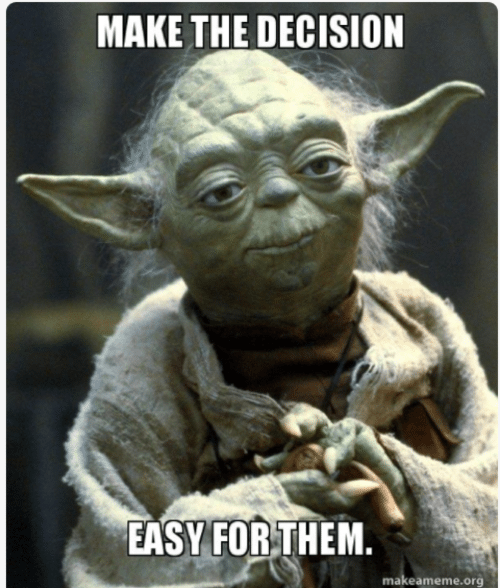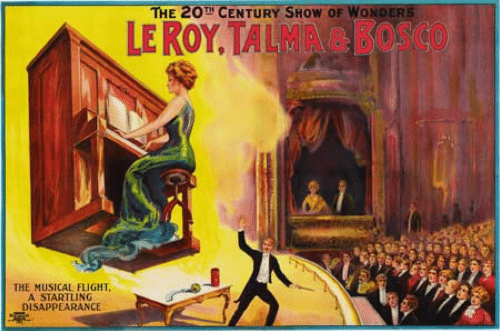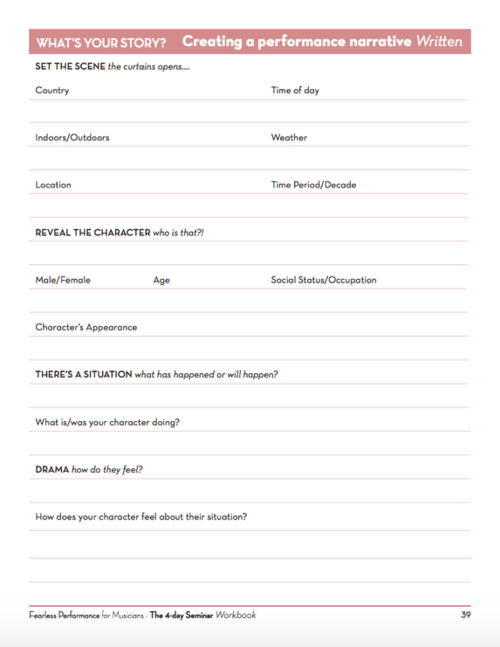
Audition Success 101 - What's Your Story?
What’s your story?
Written by Jeff Nelsen, Horn Soloist & Professor of Horn at Indiana University
I’ve often wondered how I won my first few professional auditions. I really didn’t know much about the horn or music theory. Ironically though, that lack of knowledge-clutter may have played into my success. I did grow up on a Canadian pig farm with opera singers for parents, so the daily intake of both pork chops and Puccini definitely added to my story.
My two sisters and I are all professional musicians, so there must have been something in the water. Yes, DNA matters too, but for us I believe it was much more about the music in the house and the work ethic of the farm. That’s the big part of our story that had us winning auditions. We got things done or the pigs wouldn’t eat, and then we made music that served the operatic drama, rather than just aiming to avoid mistakes or just get it right.
We were constantly discussing if the music on the radio or in concert was moving us, and getting into our hearts. Who was aiming at the notes, and who was going for the musical artistic statement. My priority of storytelling through music was shaped during those formative-year family discussions.
Every audition is a performance. Each time you perform, you share your story. The sounds that emerge from your instrument communicate to your audience who you are, why you chose your instrument, and why you stuck with it. When I walk onstage to perform, I share my story sonically. How I play what I play tells the audience whether or not I researched the composer, marked my parts, used a tuner; whether or not I stayed hydrated, exercised, meditated, slept well. Through our performances, we demonstrate our regard for the audience’s time and how we perceive our own self-worth — it’s that big of a deal.
Whether or not this audition has been a big preparation deal to you, it’s a big time-and-energy deal to your audience every time you perform. If you haven’t made this performance a big deal in your preparation, it won’t be a big deal to your audience in their listening experience of your performance. You will have made the decision easy for them the wrong way, and made it easy for them to say those famous words, “Thank you. Next.”
So, what is your story? And how best can you convey it through your performance?
Most musicians come to my fearless performance seminars to figure out how to play better. But how can musicians learn to play better? My horn faculty colleague at Indiana University, Dale Clevenger, who was the principal horn for the Chicago Symphony from 1966 until 2013, says, “Musical thought dictates technique.” Your musical thoughts about making sounds that convey drama can often drive your technical body better than your thoughts about where you should point your tongue. Thinking and planning for musical story telling rather than just technical excellence actually helps us play our instruments better. The act of looking more deeply into your music’s story has you making more of your own choices about the music. This can help make your music mean more to you. Your music is more yours.
By the end of the fearless performance seminars, people have deeply realized that every time they perform, they are sharing who they are in regards to self-belief, vulnerability, humor, time management, relationships…the list is endless. Lucky for your audition training now, there is endless information out there to help you find ways of successfully managing all these things. Yay you.
The Three P’s of Performance
Auditions are not won by mistake avoiding or technique nailing. Auditions are won by opportunity seizing. You must maximize your storytelling by adding your own dramatic purpose to the music, well above and beyond what’s written on the page. When a performer’s purpose is elevated, their process and product improve, too!
In both preparation and performance, there are three things on which we can choose to focus.
Your Process – The How
- This is your technical ability. Do you know your fingerings, breathing, posture, tongue placement, bow-arm alignment, etc.?
Your Product – The What
- This is the sound you’re making. This is what comes out your instrument and ends up on the recording from the back of the hall.
Your Purpose – The Why
- This is your storytelling! This is your approach to being on stage. It’s your reason for making this sound for Mozart and this one for Strauss. It’s why you phrase and speed up a bit to beat 2 rather than beat 1. But it’s also why you are on stage. Are you there to show off or avoid mistakes, or are you out there to share the best possible version of music you’ve diligently prepared and deeply love…and the bonus is you win the audition because you executed well?
Our mind can only focus on one of these in any split-second. Our focus jumps between these three things at different speeds, depending on our mental states during performance.
Of the three, the least interesting to your audience is process. Yes, of course nothing happens without process, but I’m not making too much love and death happen in my performance if I’m focused on trying to remember what button to push or where to put my elbow. So I figure out process enough to evolve into product-focus. I want to focus on product more than process! Product is the sound I’m making. It’s what you think Brahms wanted when he wrote what he wrote. We crescendo better when we change the product (make the sound louder) instead of focusing on process (pushing more air out our mouth).
The best of the three, though, is purpose. I’m performing my best when I’ve done a great job at working on process and product, and I get to be focused on purpose. My best performances are with music I have memorized, and I’m just sonically painting some tension and release, hope and heart-break, love and death. My fingers thoughtlessly push the right buttons, and my lips automatically move to where my musical mind guides them.
There’s a great story about the Chicago Symphony tuba player of lore, Arnold Jacobs. It was said of him that he could get to the end of a performance and not know which notes he might have missed. We think that of course it’s because he wasn’t keeping track of his mistakes, and that he didn’t make many mistakes. But what I love about the story is this. He didn’t know which notes he missed because the song in his head was louder than the song that was coming out his bell. …and he played TUBA! The bell was right next to his head. He set his goals so high, and decided to be so sure about reaching those goals, that he heard himself doing so every time he performed. Bob Moawad said it well, “Most people don’t aim too high and miss, they aim too low and hit.”
When you walk out onstage, your goal when you perform in an audition is to make the decision easy for the panel. And to be clear, you want them to easily decide TO hire you. Heh… If you were #47, they’re saying, “Well, yeah, 47 is the clear choice. But if they can’t take the gig, who was next best, #28 or #62?” They are free to discuss anyone else, but you’ve built and shared such a compelling performance that you’ve made their decision to pick you easy.

I am an amateur magician, and I often think about how we’re losing the magic in our music.

“How vastly different now is everything in magic; gone is the true magician, here is the mere trickster, the man who unconsciously had adopted the modern style, which kills his own effects. Gone the true mystery, gone the startling wonderment of the audience, to be replaced by the cold query, “How is it done?”
I missed notes in every audition I won. But I think I was telling more compelling versions of the music than the others, imperfections and all.
Make music, not technique!
We’ve all been told to be more musical. If you’ve been told recently, then DO IT! If you’ve done it in the past, and ended up playing too badly to continue playing more musically, keep doing it! It might just be that when you added more phrasing, your technician didn’t know exactly what to do. Don’t give up on risky story-rich playing! I love Steve Buscemi’s quote, “So you don’t believe in magic, eh? Well maybe that’s not magic’s fault.”
I think what gets in the way of our sharing our own story in performance is our over-focus on technical execution. I’ve seen students work very diligently at making sure they’ve figured out the technical aspects of a piece in order to earn permission to add their musical ideas. This wastes a ton of time, because whatever technical aspects they’ve refined immediately change when they add their musical ideas. That’s why at first, when we add musical shapes to music we’ve prepared, we miss more notes. What’s better is to always be shaping the musical aspects of colors and contours. Sight-read with crazy passionate music making, missing half the notes for the sake of your story. Then we practice to clean that awesome creative version up, and get it closer to the notes Mozart wrote. Give that a fearless try the next time you’re sight-reading.
 Audition Success 101 – “What’s Your Story?” Worksheet
Audition Success 101 – “What’s Your Story?” Worksheet
Speaking of something you should try…
Here is a PDF of my “What’s Your Story” worksheet
You can use the one-page worksheet as a guide to make decisions about your excerpts.
Go through your excerpt and decide what the audience sees onstage when you start playing. Evolve your sounds to create dramatic story-rich experiences for your audience. What’s YOUR version of this excerpt? You start playing some Brahms and your audience sees the curtain open to a German farmhouse in 1873, a mild fog lingers over an otherwise sunny early morning. The man is in his early 20’s, staring down at a zombie eating a grilled cheese, pitchfork in one hand and a light saber in the other. Darth Vader enters!
I don’t know?!?! You choose…and have some fun with it! …but make it compelling and clear, and above all else, of course serve the composer. Then perform for as many people as possible. They’ll tell you if you’re being clear.
I’ll leave you with a beautiful quote about meaning and opportunity of music. It’s from a wonderful musician, the conductor of the youth orchestra of my two sisters and me – Michael Massey of the Edmonton Youth Orchestra.
“Music is really a combination of emotion color light sound silence intellectual grasping and seeing the whole picture. All of those things come together in great works of art. Because I don’t consider music an entertainment. It’s not entertaining, it’s enriching. It’s something that enriches you, that gives you a different way of looking at the world. It adds dimension to the world. We’re here for a short time and yet there’s all this beauty and the great composers absorbed that and found a way to exalt that and demonstrate that and put that forward through sound. That sound then becomes a language independent of word and it speaks to us just as profoundly. It’s never rote. It’s never something that’s put down for you and you copy. That’s the difference between certain kinds of music making and really personal intimate music making. That’s one of the things I try to put across to the kids, the young people who I mentor in the youth orchestra. I try to help them develop their own individuality and their own excellence. What a great way to spend a life. I’m so lucky…I really am.”
You got this. Go do the work. Take it from this pig-farm raised professional horn playing college-dropout IU professor – go get as good as you can, and share that. Receive some comments, and go back to work. Repeat. It’s not up to you to decide if you deserve it. Henry Ford said, “Obstacles are those frightful things you see when you take your eyes off your goal.” I’m shocked by what I’ve been told by others that I got. I’m sure some other people are shocked I got it too. That’s not up to me. I’m too busy getting as good as I can, to ask if I deserve it. If I can do it, so can you. Keep answering yourself, “How much do you want it?”
Until next time,
Keep sharing!
Jeff
Jeff Nelsen is one of the many Canadian magician horn-performing professors in the world who was raised on a pig-farm with opera-singer parents. He’s writing here on auditioncafe.com because he’s won auditions both before and after he became unable to start notes in performance. He’s had mental and physical roadblocks, and he not only stayed on the road, he’s thrived on it. Jeff says, “It’s hard to teach something you haven’t had to learn.”
Probably best known for the eight years he spent touring and recording with Canadian Brass, Jeff has also performed concerti with orchestras on six continents, and in the horn sections of dozens of orchestras including the New York and Los Angeles Philharmonics, and the Boston, Chicago, Cincinnati, Montreal, Porto, St. Louis and Vancouver Symphonies. This year’s performances include South Africa, Santa Barbara, Brazil, Germany, San Diego, Seoul, Ottawa, and in home-town Bloomington Indiana. Jeff most enjoys performing with his wife, mezzo-soprano Nina Yoshida Nelsen, on recital series and in their two orchestral pops shows.
Jeff is especially proud of becoming professor of horn at the illustrious Indiana University Jacobs School of Music without having finishing his studies at McGill University in Montreal. At last calculation, he is in his 28th year of his bachelor degree in horn performance. His curious pig-farmer international horn soloist life-path brought him to become founder of Fearless Performance LLC, a company that focuses on training people of all walks of life to transcend their limited self-worth illusions, and discover how to consistently perform their absolute best in order to reach their own “unreasonable” goals. Since giving his celebrated 2011 TEDx Talk about Fearless Performance, Jeff has been training fellow TED Talkers, teachers, athletes, and business people into giving their own Fearless Performances as well.
Aside from creating musical magic, Jeff is an enthusiastic magician, and often adds touches of illusionary arts to performances. He recently reached a childhood dream of becoming a magician member of the Academy of Magical Arts at the world famous Magic Castle in Los Angeles. Go to www.jeffnelsen.com to contact Jeff and to sign up for his free “Fearless Performance” newsletter.
